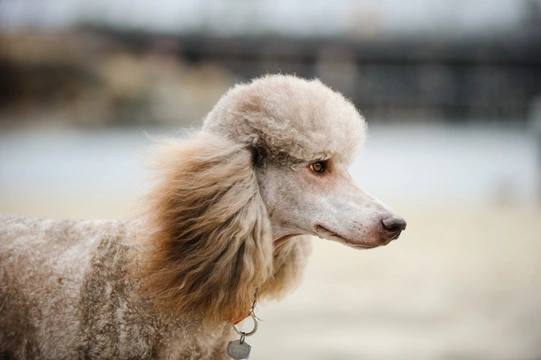
Neonatal Encephalopathy in Dogs (NE)
Neonatal encephalopathy, also known as neonatal encephalopathy with seizures or NEWS is a serious hereditary health condition that can affect puppies, and which invariably proves fatal in pups at a very early age.
The condition has been found to present within breed lines of the standard poodle dog breed, and can lead to the loss of the entire litter of pups within just a few weeks of birth.
Neonatal encephalopathy cannot be reversed, cured or avoided in dogs that carry the two copies of the gene fault that leads to the condition, and the only way that the condition can be prevented is by health testing both parent dogs prior to making a decision to breed, to ensure that they do not carry a copy of the gene that passes the condition on.
In this article, we will look at neonatal encephalopathy in more detail, including how the condition presents, risk factors for the condition, how to test for the disease, and how puppy buyers can ensure that they purchase a healthy dog. Read on to learn more.
What is neonatal encephalopathy?
Neonatal encephalopathy is a disease of the brain caused by a gene mutation that has been found to be carried by some dogs of the standard poodle breed.
It causes brain degeneration from a very young age, beginning shortly after birth, due to a mutation of the ATF2 gene, which is a gene that plays a part in producing cellular responses to stimulus when the gene is healthy and behaves normally.
Puppies with the condition will have a smaller than normal cerebellum, be exceedingly weak and fail to thrive, and will often die during their first week of life. Pups that survive past the first week will go downhill quickly, showing a lack of coordination and normal development, which may be accompanied by whole-body tremors and frequent tonic-clonic seizures too.
Few affected pups will survive past five weeks of age, and the condition has proven to be fatal in 100% of cases by seven weeks of age.
What sort of dogs are at risk of the condition?
Neonatal encephalopathy has been recognised as posing a risk to dogs of the standard poodle breed, and so, can affect puppies of this breed. The condition presents early in life, and so older puppies and adult dogs will not develop the condition or become symptomatic later on-but they may still be carriers for the condition and so, able to pass it on to their own offspring.
The condition is passed on from dog to dog by means of autosomal recessive heredity, which means that in order for a puppy to have the condition, they must have inherited the gene fault responsible for it from both sides of their parentage.
However, dogs with one poodle parent-including many popular hybrid dog breeds like the Labradoodle and cockapoo-may inherit the carrier gene from the poodle side, and so if they are then subsequently bred back to a standard poodle or another hybrid with the carrier gene, they may pass on either carrier status or affected status to their own offspring.
Health testing and heredity
Neonatal encephalopathy’s autosomal recessive mode of inheritance means that both parent dogs need to pass on the gene fault for a dog to be affected by it. An adult dog can be a carrier without being affected themselves, and if two carriers are bred, some of their pups will be affected too.
The full model for heredity of autosomal recessive health conditions are as follows:
- Two clear dogs will produce a clear litter.
- Two affected dogs will produce an affected litter.
- Two carriers will produce a litter of 50% carriers, 25% clear and 25% affected.
- A clear dog and an affected dog will produce a litter of carriers.
- A clear dog and a carrier will produce 50% carriers and 50% clear.
- A carrier and an affected dog will produce 50% carriers and 50% affected.
However, because neonatal encephalopathy is fatal in pups at such a young age, a situation will not arise where an affected dog is bred from, which helps to reduce the spread and onwards progression of the faulty gene throughout the breed pool. There still remains a risk, however, because carrier dogs will appear healthy themselves, and yet can still lead to affected puppies depending on the breeding match made in terms of the status of the other parent dog.
In order to determine the status of any given dog before breeding, a pre-breeding DNA test can be performed, which will produce a result on the dog’s carrier status. This allows breeders to find out the results of both parent dogs, and make an informed decision about whether to mate any given pair.
The test simply requires a buccal swab or blood sample, which is then sent away to a laboratory for testing to produce the result.
Advice for breeders and buyers of standard poodle puppies
All standard poodle breeders are strongly advised to have their parent dogs tested prior to breeding, in order to prevent the further spread of the condition by means of breeding carrier dogs, which can pass on both carrier and affected status to their own puppies.
Puppy buyers should ask the breeder that they are considering buying from about the results of such health tests, in order to find out whether the pup they may be thinking of buying is clear or a carrier, which of course has implications for their own offspring if they are used for breeding.



